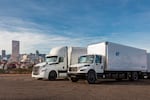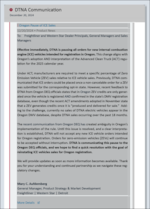One of the world’s largest commercial truck manufacturers is refusing to sell its diesel big rigs in Oregon, even though its North America headquarters is in Portland.
Daimler Truck North America is at odds with the Oregon Department of Environmental Quality’s recently adopted medium and heavy-truck standards — even though the rules are the same in 12 other states including Washington and California, and the company is still selling trucks in those states.

FILE: In this provided undated photo, Daimler's eCascadia and the eM2 are parked in Portland. They are two of the first electric semi-trucks to hit the highways.
Courtesy of Daimler Trucks North America
On Dec. 20, Daimler Truck North America shared in a private letter to dealers and sales managers it is pausing sales of its diesel-powered trucks intended for Oregon registration. That decision was first reported by Willamette Week and the Oregon Journalism Project. It came after what state regulators are calling a miscommunication about recently adopted California truck manufacturing rules that led to the halt of sales. Oregon, along several other states, have opted to adopt California’s vehicle emissions standards under the federal Clean Air Act. Each of those states must adopt the same rules as California. Daimler officials claim there are differences, while DEQ staff said that’s the result of a misunderstanding.

A screenshot of a Dec. 20, 2024 Daimler Truck North America's note informing dealers the company will halt sales of their diesel trucks in Oregon citing a difference in how the Oregon Department of Environmental Quality provides credits for electric vehicle sales.
Oregon Department of Environmental Quality / Oregon Department of Environmental Quality
After their miscommunication with Daimler Truck North America, state regulators said they clarified how manufacturers can receive credits for selling zero emission vehicles under the updated rules, but the company has not withdrawn the sales pause across the state.
“The note we’ve received from the Oregon Department of Environmental Quality staff indicates that they are implementing key provisions of the Advanced Clean Trucks rule differently than California,” Daimler Truck North America said through a spokesperson in an email to OPB on Thursday. “Unfortunately, that difference leaves us unable to predict our credit balances in Oregon, and therefore risks our compliance in the state.”
Daimler Truck North America officials said for the company to remove the pause, they need “reasonable, durable assurance from Oregon DEQ” that the company’s approach for reporting the credit for vehicles sold is appropriate and consistent with California.
“Assuming we get that resolution, we expect to be able to lift our temporary sales hold in Oregon – however, the Advanced Clean Truck Rules will still limit our ability to sell internal combustion engines (diesel) vehicles based on the number of zero emission vehicles we sell in the state,” Daimler Truck North America officials said.
DEQ and Daimler were set to talk Friday.
Understanding the Clean Truck Rules
Back in 2021, the Oregon Department of Environmental Quality’s Commission adopted California’s Clean Truck Rules. The rules create stricter standards for medium to heavy-duty trucks, including requiring truck manufacturers to meet tougher emission standards for particulate matter and for nitrogen oxides pollution, or the combustion of fossil fuels in vehicles.
The rules also require manufacturers of medium to heavy-duty vehicles, like large pick-up trucks, buses and 18-wheelers, to sell a certain percentage of zero emissions electric vehicles starting with the 2025 model year.
Adopting California’s rules means the rules must be implemented exactly as California created them, DEQ’s transportation strategy section manager Rachel Sakata said. That’s because under the federal Clean Air Act, only California is allowed to set separate emissions standards from the federal emissions requirement, and states that opt to follow California must do so identically, she said.
“We can’t deviate at all because otherwise it creates a patchwork of different requirements and anything that California adopts, we also adopt identically, and then we would follow also identically,” she said.
For example, Washington, another state that opted to follow California’s rules, Oregon and California all have the same sales requirements and percentages manufacturers need to meet in zero emission vehicle sales.

The Oregon Department of Environmental Quality's Medium and Heavy Duty zero emissions sales percentage graph shows the gradual increase of zero emission sales truck manufactures must meet through 2036.
Oregon Department of Environmental Quality / Oregon Department of Environmental Quality
Even though adoption of the California rules needs to be identical in all the states that have opted in, Daimler Truck North America officials said the company has seen some “exemptions” in other states. For Oregon, they said the issue was the interpretation of “sales” versus “registration.”
In November, the state’s Environmental Quality Commission adopted temporary rules delaying the tougher emissions standards — but not the sales portion of the rule, which trucking industry advocates in Oregon have been calling for a delay of implementation. They are asking to wait until the technology improves, like better battery life for big rigs.
Under the updated rules, in 2025 all medium to heavy-duty vehicle manufacturers would need at least 7% of their overall new pickup truck, van and big rig sales to be electric vehicles.
“The requirements do ramp up over time to where, by 2036, the requirements will range between 40% to 75% depending on the class of vehicle,” Sakata said. “Manufacturers will still be able to sell internal combustion engines like diesel trucks, even when the rules are fully implemented in 2036.”
But that’s a sticking point for the trucking industry, as some have said there is not enough infrastructure like charging stations to support the switch to electric trucks. In Oregon, there is only one high-powered public station for trucks like big rigs. It’s located at Daimler Truck North America’s headquarters on Swan Island in Portland.
Sakata said the updated rules allow truck manufacturers an additional three years to be in compliance.
“We adopted some additional compliance flexibilities for the manufacturers, so that they have an additional 3 years to make up any what we call compliance deficits,” she said. “So if they weren’t able to meet their sales targets in 2025, they actually have through 2028 to make up those deficits.”
Once truck manufacturers sell these electric vehicles, they can receive credits, which are broken up by different class vehicles.
But selling electric vehicles is not the only way to be in compliance with the rules, Sakata said.
Other options include selling plug-in hybrids, purchasing credits from other truck manufacturers or earning early action credits from electric truck sales made between 2022-2024, Sakata said.
Daimler Truck North America officials said there needs to be a comprehensive approach, as the company’s electric vehicle sales are less than 1% of their overall sales. They said the transition to electric vehicles should be gradual for a smooth transition.
Miscommunication through email
In the Dec. 20 note to its dealers, the Daimler Trucks North America cited “ambiguity” in how the company could receive early credits from DEQ. That led to the company halting sales of its diesel trucks in Oregon until the issue can be resolved.
According to Sakata, DEQ was working on verifying sales from the company to provide early action credits for the company.
“In an email, we were just requesting some additional information, such as proof of registration, because under the previous rules, it did require that manufacturers had to, in order for them to earn a credit, show that it was delivered to the ultimate purchaser, which would mean that you’d be registered in the state.” she said. “So we had requested some of that information to verify those early action credits. I think that’s sort of what created some of the confusion between Daimler and DEQ.”
The new rules adopted in November updated how manufacturers can earn credits when in the state when new trucks are delivered in the state, Sakata said, rather than waiting for registration confirmation through the Oregon Driver and Motor Vehicles database.
But in its note to dealers, Daimler claims no electric vehicle sales showed up in Oregon’s DMV database, despite sales occurring for the past 18 months.
“The DEQ has not recognized the products we have sold in the state as zero emissions vehicles, which prevents us from selling even a small number of internal combustion engine products in Oregon,” Daimler Truck North America officials said.
DEQ met with Daimler Truck North America immediately on Dec. 20 after the agency was made aware of the note. According to Sakata, the agency cleared up the miscommunication and clarified the company did not need to show proof of registration.
Despite the meeting, Sakata said Daimler Truck North America emailed DEQ saying the company still had issues with the rules and the pause will remain in place.
“While the DEQ later confirmed that they won’t require DMV registration to receive credits, it wasn’t confirmed that we will receive credits for zero emission vehicles sold. We hope for more clarification on this issue soon,” Daimler Truck North America officials told OPB on Friday.
Both Daimler and DEQ said they are in talks to find a solution soon.
